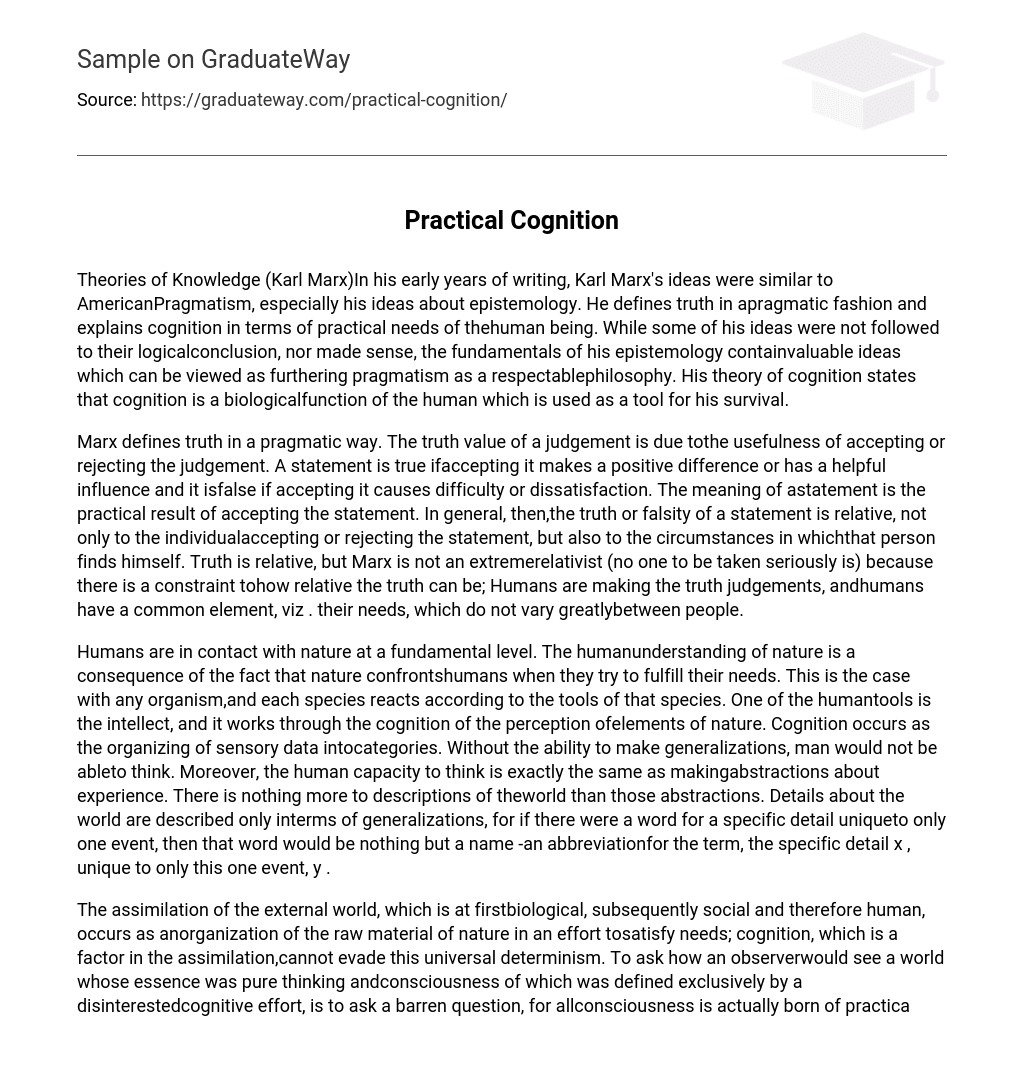Theories of Knowledge (Karl Marx)In his early years of writing, Karl Marx’s ideas were similar to AmericanPragmatism, especially his ideas about epistemology. He defines truth in apragmatic fashion and explains cognition in terms of practical needs of thehuman being. While some of his ideas were not followed to their logicalconclusion, nor made sense, the fundamentals of his epistemology containvaluable ideas which can be viewed as furthering pragmatism as a respectablephilosophy. His theory of cognition states that cognition is a biologicalfunction of the human which is used as a tool for his survival.
Marx defines truth in a pragmatic way. The truth value of a judgement is due tothe usefulness of accepting or rejecting the judgement. A statement is true ifaccepting it makes a positive difference or has a helpful influence and it isfalse if accepting it causes difficulty or dissatisfaction. The meaning of astatement is the practical result of accepting the statement. In general, then,the truth or falsity of a statement is relative, not only to the individualaccepting or rejecting the statement, but also to the circumstances in whichthat person finds himself. Truth is relative, but Marx is not an extremerelativist (no one to be taken seriously is) because there is a constraint tohow relative the truth can be; Humans are making the truth judgements, andhumans have a common element, viz . their needs, which do not vary greatlybetween people.
Humans are in contact with nature at a fundamental level. The humanunderstanding of nature is a consequence of the fact that nature confrontshumans when they try to fulfill their needs. This is the case with any organism,and each species reacts according to the tools of that species. One of the humantools is the intellect, and it works through the cognition of the perception ofelements of nature. Cognition occurs as the organizing of sensory data intocategories. Without the ability to make generalizations, man would not be ableto think. Moreover, the human capacity to think is exactly the same as makingabstractions about experience. There is nothing more to descriptions of theworld than those abstractions. Details about the world are described only interms of generalizations, for if there were a word for a specific detail uniqueto only one event, then that word would be nothing but a name -an abbreviationfor the term, the specific detail x , unique to only this one event, y .
The assimilation of the external world, which is at firstbiological, subsequently social and therefore human, occurs as anorganization of the raw material of nature in an effort tosatisfy needs; cognition, which is a factor in the assimilation,cannot evade this universal determinism. To ask how an observerwould see a world whose essence was pure thinking andconsciousness of which was defined exclusively by a disinterestedcognitive effort, is to ask a barren question, for allconsciousness is actually born of practical needs, and the act ofcognition itself is a tool designed to satisfy these needs.(1)A world which is independent of what humans might think, which is what thelogical positivists seek to know, is useless to humans, and impossible for ahuman to comprehend. Even to say, It is impossible for a human to comprehend theworld in its pure form, words the problem incorrectly because the very meaningof comprehend contradicts anything which is not artificially broken intoabstractions.
According to Marx, the world seems to be naturally divided into species andgenera, not because the world divides them as such, but because man is at oddswith his environment at a fundamental level and the categories into which hisworld is divided are a natural result of his effort to survive.
We do not have concepts that are not useful to our survival, or do not help usin our endeavors, though such concepts could easily fit in our intellectualcapacity. We could ostensibly make the general dichotomy of objects that eitherding or thud when hit regardless of whether such a dichotomy is useful. We donot have a word for such a dichotomy. The point is that “natural” distinctionsare still artificially applied by the human intellect upon the world which hasno such distinctions inherently, but those distinctions seem natural becausethey helped humans survive and succeed in their efforts. Marx’s theory ofknowledge is a form of pragmatism which includes elements of Darwinism thatexplain how certain types of categorizing became prevalent.
Category: Philosophy





